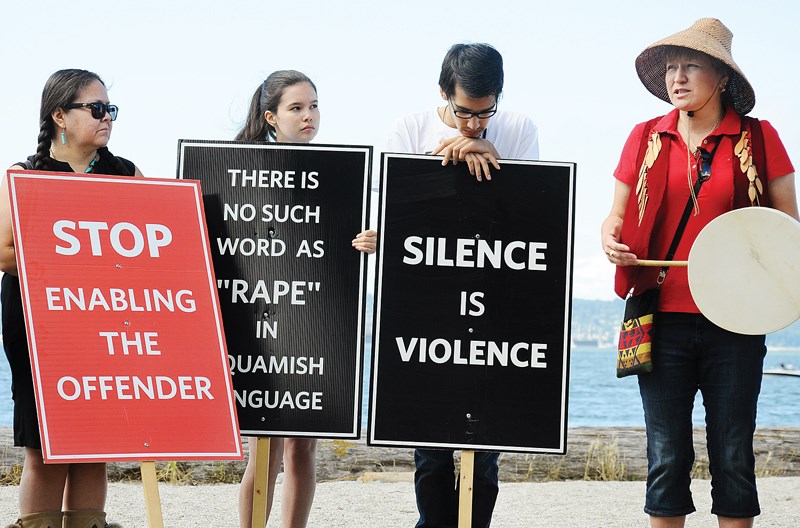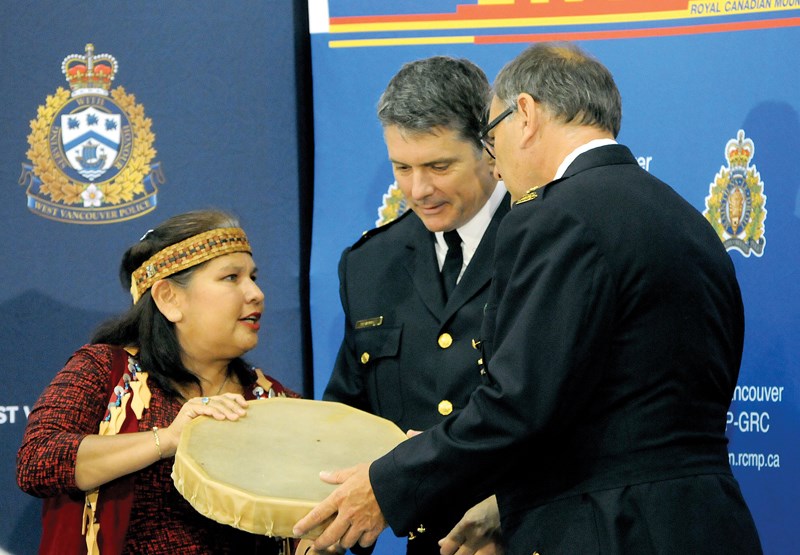It will be all-hands on deck for domestic violence cases on the North Shore with the launch of a new effort joining police, government and non-profit agencies to address the problem.
The North Shore Domestic Violence Unit was officially launched at Squamish Nation’s Chief Joe Mathias Centre Tuesday morning.
The new unit brings together members of the North Vancouver RCMP, West Vancouver Police Department, Squamish Nation, Hollyburn Family Services and the Ministry of Children and Family Development all into one office in West Vancouver.
The idea was first pitched by Hollyburn Family Services, which applied for and received $100,000 in funding from the province’s civil forfeiture fund. It will allow police and non-profits to work with “laser-like focus” on case co-ordination, risk assessment, offender management, safety planning and support for victims.
“Being co-located with all eyes on the file means we’re all co-ordinating our efforts … as opposed to chasing each other around the community,” said Nanette Taylor, Hollyburn’s executive director.
The new North Shore unit is the eighth domestic violence unit to be created in B.C. since 2014.
Those units have higher conviction rates and lower rates of recidivism by offenders, according to Cpl. Fred Harding, the West Vancouver Police Department’s domestic violence co-ordinator.
Incidents of domestic violence reported have been steady in recent years, with about 300 reports every year in West Vancouver, Harding said. About 140 of those are considered serious, involving an assault of some kind, and 20 are considered very serious.
“We have multiple agencies … who all sit around the table to look at how best we can serve the victims of those crimes,” Harding said, adding those cases were previously often dealt with off the side of someone’s desk.
The new domestic violence unit also brings in a justice worker from the Squamish Nation to help guide investigators on culturally appropriate responses in dealing with the perpetrators and victims, Harding said.
“What we need in communities where there is diversity is representation of that diversity on the front end, recognizing the very different issues that face those people,” he said.

While arrests and support are needed, a wider change in the culture is still required, Taylor said. Part of that is encouraging victims to come forward, something Squamish Nation member Sheryl Rivers did at the announcement.
“I’m a leader. I’m a strong courageous woman. I’m a member of the Squamish Nation,” said Rivers. But Rivers said she is also a survivor of domestic violence.
“These kinds of things take work, coming together. It takes someone like myself first hand to share my story that it’s not OK. This is not OK,” she said.
Rivers presented the unit’s leaders with a drum she made as a gift to the unit.
“I put a lot of love and energy and strength into it and I hope that it will help guide and protect future men, women or children that are going through a traumatic experience such as this,” she said.
Harding also emphasized the need for victims or their loved ones to come forward.
An average of 14 people are killed by their intimate partners every year in B.C. A quarter of violent crimes in the province happen between spouses.
Two thirds of domestic violence cases go unreported and 20 per cent of women who are victims of assault are victimized 10 or more times, according to police.
“If you know of a person who is living in crisis, let somebody know – particularly the police department and then we’ll take it from there,” he said. “And we’ll do our damnedest not to fail anybody who comes to our attention.”



